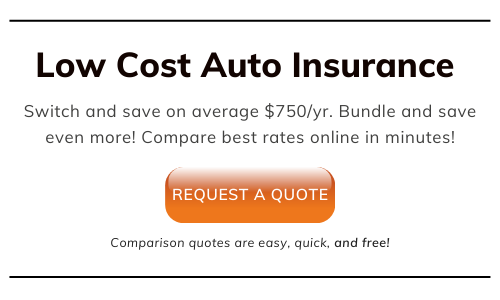Best Auto Insurance Reviews & Ratings for All Coverage Types
Selecting the right car insurance provider can be challenging.
There’s so much to consider, and since most states require you to have car insurance, there’s no way of avoiding the process.
Of course, we want you to get the best car insurance for your money. That is our top priority!
And it’s why we strongly recommend that you do your research before you commit to a company, to ultimately ensure you save money and get you a higher level of satisfaction with your final choice of providers.
We recommend you take your time doing your research and definitely read online auto insurance reviews.
This source of information from fellow consumers can give you an idea of how much premiums cost, what you’re getting for your money, and how insurance companies operate.
Other factors that you may not normally think about, such as the benefit of a rental car when yours is in the shop, may end up playing a determining factor in your selection process.
Looking at auto insurance reviews and doing comparative shopping is the easiest way to find out all you need to know about reliable and trustworthy insurers in your state.
We think and breath insurance and want you to get the best coverage at the right price.
Because of this, we’ve done our homework on car insurance companies to assist you in making the process even simpler.
We’ve aggregated some of the industry’s top research in one place, hopefully enabling you to make a more informed decision. Ok, let’s get started.
Understanding Car Insurance Company Reviews

Price and service offering, financial stability, and customer satisfaction are three critical factors in a car insurance company review.
Getting the best car insurance requires you to become aware of these contributing factors.
Price and Service Offering:
While the cost of insurance can vary significantly from state to state, there are comparison tools online that give you a rough idea of how much you can expect to pay and what kind of coverage you get for your money.
Price is important, we get that, but so is the coverage you get for the price.
Additionally, a provider that has the cheapest rate in one state may not have the most competitive price in another, so it’s important to shop around.
The cost of premiums and the services offered often form the cornerstone of auto insurance reviews, but there is more to consider.
Financial Stability:
The higher the financial strength rating of an insurance company, the more stable it is and the more likely the company will pay your claims.
After all, you want your insurance company to be there when you need it most in the years ahead.
Companies receive financial strength ratings from independent rating organizations that intricately analyze the financial performance of an insurance company.
If you can’t find financial strength ratings listed in auto insurance reviews, go to A.M.
Best and Standard & Poor’s online to look up an auto insurance company you are interested in.
The records are accessible to consumers, so you can check the financial strength of any insurance provider you’re considering. It’s great stuff.
Customer Satisfaction:
Perhaps the most critical factor that contributes to insurance companies’ ratings is customer satisfaction.
A consumer’s overall experience is based on many factors including the ease of communication with representatives and the efficiency of claims processing, for example.
J.D. Power publishes an annual Auto Claims Satisfaction Study consisting of condensed auto insurance reviews that rank insurance providers based on customer satisfaction.
We can’t stress just how important this factor is.
Top Insurance Providers
When it comes to the best car insurance companies, here are some that stand out among the rest.
Geico
The J.D. Power 2017 Auto Claims Satisfaction Study ranked Geico 6th in the U.S., after receiving consistently positive ratings from consumers in all categories.
However, the J.D. Power 2018 Shopping Study shows that the company is “about average” in customer satisfaction.
Geico‘s complaint ratio is under the national average, at 0.96 (complaints vs. premium dollars).
The number of total complaints received decreased significantly between 2015 and 2018, showing that the company is doing its utmost to improve its customer satisfaction.
A.M. Best and Standard & Poor’s both awarded Geico a financial strength rating of “AA+,” one of the highest ratings available.
Progressive Auto
Of the seven claims processing included in the J.D. Power 2017 Auto Claims Satisfaction Study, Progressive Auto received a ranking of three out of five in six of the seven categories, which is considered above average.
Across the U.S., Progressive receives around 25 percent more complaints than the average insurance company, according to them.
Progressive’s complaint ratio (comparing complaints received to premium dollars) is 1.24, which is only slightly higher than the national median of 1.00.
Progressive’s financial health is in excellent standing.
Standard & Poor’s awarded Progressive an “AA” rating, the second-highest accolade possible after its “AAA” rating.
State Farm
According to the 2017 J.D. Power Claims Satisfaction Report, State Farm was ranked “average” in most categories, but “above average” in the estimation process category.
The Californian Complaint Ratio Study, chosen because it’s the most populous state in the U.S., found that there were 120 justified complaints against State Farm.
Its total claims exposure or policies written is more than 3.8M, making its complaint ratio 3.1 per 100,000 policies.
This puts the State Farm Auto insurance ratings in the top 36 percent of the 50 companies ranked, as the median ratio for the study was closer to five.
State Farm Auto Insurance received the highest possible accolade that A.M. Best offers, a rating of “A++,” attesting to its financial strength, which should provide great peace of mind to policyholders.
Read More:
Allstate
In the 2017 J.D. Power Claims Satisfaction Report, Allstate was awarded a rating of about average in most categories associated with claim filing and an above average score in the estimation and repair processes.
Allstate ranks 12th in the California Complaints Ratio Study.
With 50 justified complaints and a total claim exposure (or written policies) of 1,978,516, its justified complaint ratio is 2.5 per 100,000 policies.
Allstate has sound financial backing, with Moody’s Investors Service awarding the company an “A3” senior ranking for insurance financial strength with a stable outlook for the future.
Esurance
In the J.D. Power 2017 U.S. Auto Claims Satisfaction Study, Esurance performed about average, receiving a rating of three out of five in six of the seven categories, and two out of five in the remaining category.
The California Complaint Ratio Study found 14 justified complaints received from a claims exposure of 263,523 written vehicle policies, giving Esurance a complaint ratio of 5.3 per 100,000 policies.
This puts the company almost in the exact middle amongst the 50 companies studied.
A.M. Best awarded Esurance a financial strength rating of “A+,” or “excellent.”
This means the company has the resources to pay out claims that may occur.
Liberty Mutual
The J.D. Power 2017 U.S. Auto Claims Satisfaction Study ranks Liberty Mutual as below average in four categories, and average in the remaining three categories.
This puts Liberty Mutual in the lower third of the 26 companies surveyed.
The California Complaint Ratio Study also found that Liberty Mutual’s complaint ratio (complaints vs. policies written) is quite poor, placing the company at 45th out of the 50 insurance providers surveyed.
Fortunately, A.M. Best has awarded Liberty Mutual a financial strength rating of “excellent,” so the company does have the financial backing to pay out any claims you may have.
Amica
The 2017 Auto Claims Satisfaction Study conducted by J.D. Power awarded Amica some of the best results available in an auto insurance review.
Amica received the top award, ranking first among 26 companies.
As revealed by the California Consumer Complaint Study, Amica only had three justified complaints and an approximate exposure of 71,371 written policies, resulting in a justified complaint ratio of 4.2 per 100,000 policies.
Fitch Ratings awarded Amica a rating of “A,” indicating good financial strength, and a definite ability to process and pay out large numbers of claims, should they arrive.
Metromile
Metromile wasn’t included in the J.D. Power 2018 Shopping Study or the 2017 Auto Claims Satisfaction Study.
The National Association of Insurance Commissioners states the Metromile’s closed complaint ratio is 1.4 (complaints vs. premium dollars) due to seven complaints received during 2017.
This is 40 percent more than the average of 1.00.
A third-party review of Metromile’s financial history (available from the NAIC) is a good idea for people looking for information regarding the financial stability of Metromile.
The General
The J.D. Power 2017 Auto Claims Satisfaction Study doesn’t rank this company individually but does list its parent company, American Family.
American Family received an average score in all of the categories in the study.
The National Association of Insurance Commissioners’ complaint database shows that The General has more annual complaints than the national average, but the amount of complaints has decreased noticeably over recent years.
A.M. Best awarded The General a financial strength rating of “A,” or excellent.
MetLife
J.D. Power ranked MetLife as average in its 2017 Auto Claims Satisfaction Study, and the company finished in the lower middle among the 26 companies.
There were 14 justified complaints in California during 2016 from an approximate exposure of 151,784 written policies, according to the California Consumer Complaint Study.
This gives MetLife a justified complaint ratio of 9.2 per 100,000 policies, rather high amongst its competitors.
Standard & Poor’s and Fitch’s Ratings listed MetLife as “AA-,” meaning the financial outlook for the future is positive.
AAA
The 2018 J.D. Power insurance shopping study ranked the Californian subsidiary of the AAA, Auto Club of Southern California Insurance Group.
It received a rating of “better than most” in all categories.
AAA Auto Club manages its insurance by state, so there are no national complaint figures available and not all states provide data.
Looking at Florida and Michigan, the company had considerably lower ratios than average (1.00) at 0.44 and 0.22, respectively.
A.M. Best awarded AAA Auto Insurance a superior mark on its financial strength ratings, meaning that it’s a financially sound company.
AARP
AARP was rated as one of the best performing insurance providers in the 2017 J.D. Power Claims Satisfaction Study (under its parent company, The Hartford), receiving a rating of “better than most” in almost all categories.
However, The Hartford, which underwrites AARP insurance policies, was ranked 34 out of 50 insurance providers in California, with a total of 14 justified complaints throughout 2016.
Moody’s Investors Service gave it a rating of “A2,” which is indicative of low credit risk.
Read more: AARP Auto Insurance Review
USAA
USAA was one of the top-performing insurance providers in the J.D. Power 2017 Claims Satisfaction Study, with a rating of “among the best” in several categories, and “better than most” in the remaining categories.
The 2017 National Association of Insurance Commissioners’ report showed that USAA received 449 complaints that year, a seven percent decrease compared to 2016 and giving them a complaint ratio (complaints vs. premium dollars) less than the national average.
Moody’s awarded USAA its highest rating of “AAA,” confirming the company’s long-term stable outlook and good financial health. (For more information, read our “USAA vs. AAA | Auto Insurance Comparison“).
Travelers
Travelers performed midrange in the J.D. Power 2017 U.S. Auto Claims Satisfaction Study, where it received a rating of three out of five in all but one category.
The National Association of Insurance Commissioners recorded only three complaints against Travelers throughout 2017 resulting in a justified complaint ratio of 0.36 (complaints vs. premium dollars), which is well below the national average of 1.00.
A.M. Best issued a financial strength rating of “A” or excellent, meaning that the company is trustworthy and has the financial resources to pay claims.
Ok, we hope you got some good information from this review and that you feel you are in a better position to get a cheaper car insurance premium.
Remember, before you sign on the dotted line, shop around and check out auto insurance reviews.
We don’t want you to miss out on a better deal or better company.


